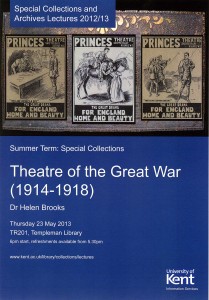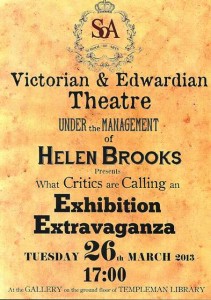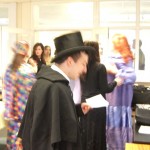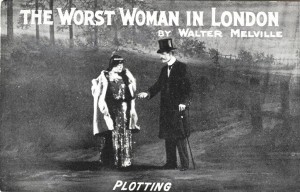I hope I don’t seem too self-satisfied at reporting on another very successful Special Collections event – lots of people put in lots of really hard work, so I’d like to thank them all by making the success public!
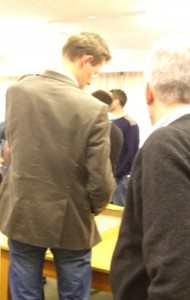 Earlier in the term, we ran our first ‘Meet Special Collections’ event, for members of the History staff. This was the brainchild of Steve Holland, and the whole team worked brilliantly to pull together various items in our collections which we hoped would engage the interest of some of our academic staff. The event went down well (as did the canapes and wine, I think) and we agreed that we should go ahead with a second session aimed at History postgraduates, and those members of staff who weren’t able to come to the first event.
Earlier in the term, we ran our first ‘Meet Special Collections’ event, for members of the History staff. This was the brainchild of Steve Holland, and the whole team worked brilliantly to pull together various items in our collections which we hoped would engage the interest of some of our academic staff. The event went down well (as did the canapes and wine, I think) and we agreed that we should go ahead with a second session aimed at History postgraduates, and those members of staff who weren’t able to come to the first event.
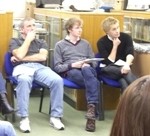 Well, following the exhibition, first Special Collections lecture and a very busy term, we pulled out all of the stops to put on a (quiet and very careful) Meet Special Collections event for History postgraduates in the reading room last Wednesday. A lot of hard work and planning went into this; from discussing areas of interest with Katie Edwards, Liaison Librarian for History, investigating our collections to pull together relevant material and clearing, cleaning and decorating the reading room to give it a really festive feel. Nick Hiley, Head of the British Cartoon Archive, kindly loaned us some flat, table-top cases, to avoid any accidents with wine and rare books/archival material: once we’d found the relevant keys, we were away!
Well, following the exhibition, first Special Collections lecture and a very busy term, we pulled out all of the stops to put on a (quiet and very careful) Meet Special Collections event for History postgraduates in the reading room last Wednesday. A lot of hard work and planning went into this; from discussing areas of interest with Katie Edwards, Liaison Librarian for History, investigating our collections to pull together relevant material and clearing, cleaning and decorating the reading room to give it a really festive feel. Nick Hiley, Head of the British Cartoon Archive, kindly loaned us some flat, table-top cases, to avoid any accidents with wine and rare books/archival material: once we’d found the relevant keys, we were away!
We focused on three main areas: war (since UoK’s History department has undergraduate and postgraduate courses specialising in the history of war), rare books and manuscripts (for historians of Medieval and Early Modern periods) and, of course, a Christmas themed table.
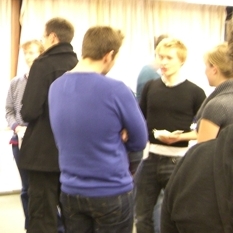 We were aided in our efforts by the re-discovery of part of a collection in the library stores: photographs of soldiers (presumably at the front) from the second world war (more to come on these in the New Year). We also used elements of the Hewlett Johnson and Bernard Weatherill Collections to illustrate twentieth century warfare, with some books and copies of the Illustrated London News for the Crimean War. Our manuscript documents from the 15th-17th centuries took pride of place on the second table, along with some of the beautifully written manuscript books on science (mostly astronomy and physics), from the Maddison Collection, which are written in anglicana and secretary hands. This table also hosted sample of the materials in Jack Johns’ Darwin Collection and our pre-1700 books section. The third table, focusing on all things seasonal, displayed some of the Melville theatre materials – pantomime scripts, flyers, books of words and images. A selection of books about Christmas carols, traditions and some of the seasonal material in our Charles Dickens Collection completed the festive theme.
We were aided in our efforts by the re-discovery of part of a collection in the library stores: photographs of soldiers (presumably at the front) from the second world war (more to come on these in the New Year). We also used elements of the Hewlett Johnson and Bernard Weatherill Collections to illustrate twentieth century warfare, with some books and copies of the Illustrated London News for the Crimean War. Our manuscript documents from the 15th-17th centuries took pride of place on the second table, along with some of the beautifully written manuscript books on science (mostly astronomy and physics), from the Maddison Collection, which are written in anglicana and secretary hands. This table also hosted sample of the materials in Jack Johns’ Darwin Collection and our pre-1700 books section. The third table, focusing on all things seasonal, displayed some of the Melville theatre materials – pantomime scripts, flyers, books of words and images. A selection of books about Christmas carols, traditions and some of the seasonal material in our Charles Dickens Collection completed the festive theme.
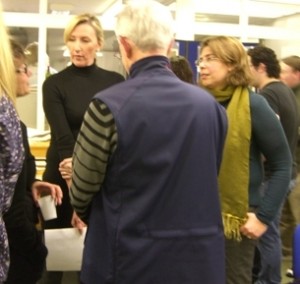 We were delighted to welcome so many members of the History department to Special Collections, and to be able to introduce ourselves and our materials. It was a great opportunity to discuss materials which would be useful for teaching and in research – some of the materials were being seen for the first time by the department. It was also helpful for us to be talk to the historians to get an idea of the types of materials which might interest them, which should be prioritised and acquired by Special Collections. Steve was also able to give the Special Collections Review document – which he has spent months preparing – its first outing to the School.
We were delighted to welcome so many members of the History department to Special Collections, and to be able to introduce ourselves and our materials. It was a great opportunity to discuss materials which would be useful for teaching and in research – some of the materials were being seen for the first time by the department. It was also helpful for us to be talk to the historians to get an idea of the types of materials which might interest them, which should be prioritised and acquired by Special Collections. Steve was also able to give the Special Collections Review document – which he has spent months preparing – its first outing to the School.
Following the event (other than the tidying up), we’ve been encouraged by such enthusiasm and interest from the department. We really hope that researchers will be encouraged to look at the wealth of resources which we have in Special Collections and use them to their best advantage. So that’s something to look forward to – with great anticipation – in the New Year. Many thanks to the History department for coming in such numbers and showing such enthusiasm. If your department would like to arrange to ‘Meet Special Collections’, please do get in touch.
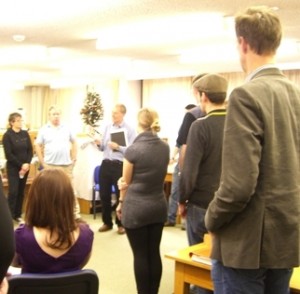 2011 has been a very busy year for us all and overall it’s been amazingly successful. There have been some changes and we know there are lots more changes to come. We hope that these will help us to provide better and more efficient service to every researcher. I’m sure there will be lots of challenges (brief timescales for a Dickens exhibition in February have already been noted) but if next year is anything like this one, I’m sure we’ll look back on it with satisfaction and some bewilderment as to how we managed to cram quite so much in!
2011 has been a very busy year for us all and overall it’s been amazingly successful. There have been some changes and we know there are lots more changes to come. We hope that these will help us to provide better and more efficient service to every researcher. I’m sure there will be lots of challenges (brief timescales for a Dickens exhibition in February have already been noted) but if next year is anything like this one, I’m sure we’ll look back on it with satisfaction and some bewilderment as to how we managed to cram quite so much in!
We look forward to seeing you when we reopen on 4th January.
From all of us in Special Collections, we wish you a very merry Christmas and a happy, healthy and prosperous 2012.
 The launch was started with a lecture by Professor Kate Newey from the University of Exeter, who spoke about the subtle protest in suffragette parlour dramas and the deliberate inversion of the female stereotype by campaigners for womens emancipation. The event then moved to the gallery space in the Templeman Library, where everyone enjoyed this rare opportunity to see such different collections side by side.
The launch was started with a lecture by Professor Kate Newey from the University of Exeter, who spoke about the subtle protest in suffragette parlour dramas and the deliberate inversion of the female stereotype by campaigners for womens emancipation. The event then moved to the gallery space in the Templeman Library, where everyone enjoyed this rare opportunity to see such different collections side by side.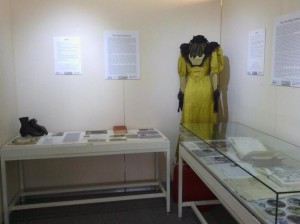 This exhibition really is an intriguing and entertaining look at the way in which perceptions of women and society as a whole were being challenged a century ago and is only on until 31st May, so please do come and have a look around when you’re next in the Templeman.
This exhibition really is an intriguing and entertaining look at the way in which perceptions of women and society as a whole were being challenged a century ago and is only on until 31st May, so please do come and have a look around when you’re next in the Templeman.
